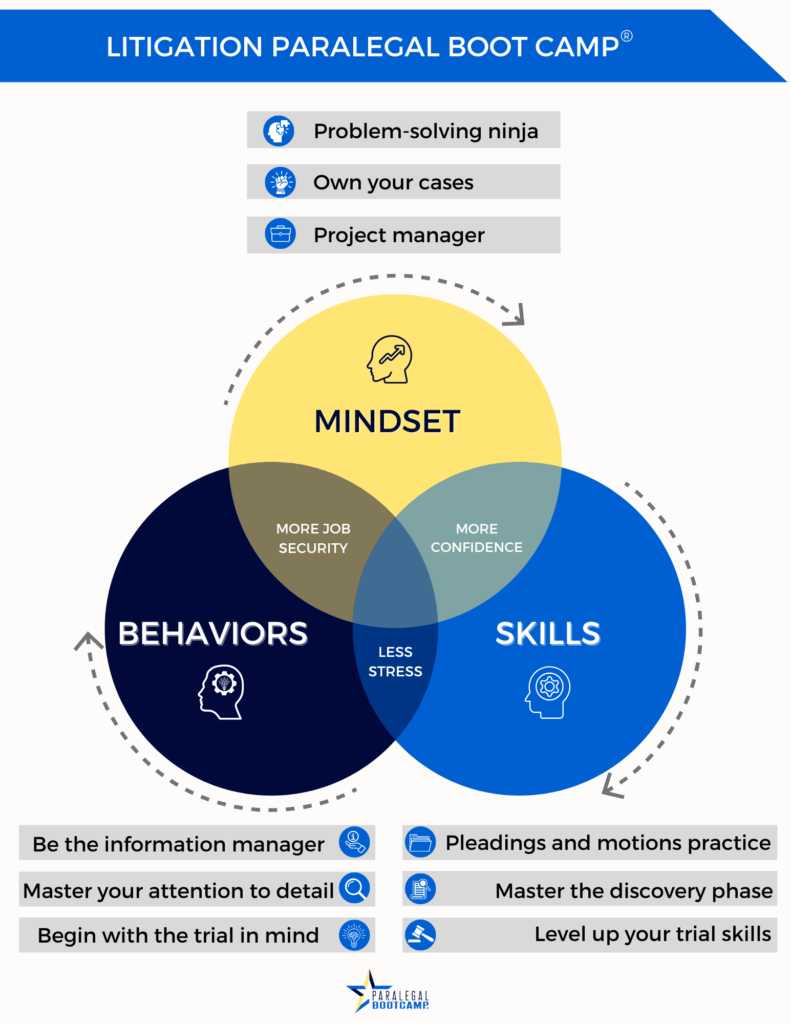WHAT IS A LITIGATION PARALEGAL?
A litigation paralegal is someone who works under the supervision of an attorney who practices in criminal or civil litigation. A litigation paralegal assists the attorney with many case management duties, from the complaint through the trial and the appeal.
Three primary areas of case management responsibility include:
-
- Draft pleadings and motions.
- Assist with discovery.
- Assist at trials, arbitrations, and mediations.
Those paralegal job responsibilities can sound vague to someone who does not already work in the legal profession, so let’s take a closer look at a few key responsibilities of a litigation paralegal.
Before we take a deep dive into the job responsibilities, skills, salaries, and other aspects of a litigation paralegal career – if you are someone who is researching whether or not to invest in a paralegal certificate program to be a litigation paralegal, I think it is important to hear some things that you won’t hear from the paralegal certificate programs advertising to you to get you to enroll in your programs.
It’s not that I’m discouraging you from enrolling in a paralegal certificate program! I just think you should have all of the information and be a well-informed buyer before investing your money into a career that might not be what you thought it was.
That being said – I absolutely LOVED being a litigation paralegal! And if you explore this website and the blog articles, video interviews, and podcast interviews, you’ll find hundreds of others who also enjoy being litigation paralegals as well.
A behind-the-scenes look at life as a litigation paralegal
Litigation Paralegal Job Responsibilities
1. Draft pleadings and motions.
What does that mean?
The attorney looks to the litigation paralegal to do the initial drafting of documents that will be sent to the court, asking the court for relief (the Complaint) or for the court to take action during the case (a motion).
Examples of a few motions that a litigation paralegal might draft:
🖋️ Motion to Dismiss (to request the court to dismiss the case on procedural issues)
🖋️ Motion to Compel (to force another party in the case to comply with discovery requests)
🖋️ Motion for Summary Judgment (to request the court to decide the case, or a portion of the case, without a trial based on the facts)
🖋️ Motion in Limine (to request the court to exclude the other side from preventing certain evidence from being presented at trial)
Many attorneys rely on the paralegal to draft the first draft of pleadings that will be filed with the court. Often, a similar version of that pleading or motion is already in the firm’s document system, which the paralegal can use as a starting point.
Other times, the attorney drafts the initial version and the paralegal finalizes and proofreads the motions before they get filed or served on opposing counsel. This can also involve gathering exhibits and affidavits that may be attached to the motions.
2. Assist with discovery.
What does that mean?
Just like the word sounds: Discovery in litigation is the phase where the parties are discovering what evidence the other side has against each other.
When a litigation paralegal is assisting with discovery, that means they could be doing the following things:
✅ Drafting requests for the production of documents to other parties in the lawsuit.
✅ Drafting interrogatories (written questions) to other parties in the lawsuit.
✅ Drafting notices of depositions for other parties to appear and answer questions under oath.
✅ Assisting the client with gathering documents to be able to respond to opposing counsel’s request for production of documents.
✅ Preparing deposition notebooks for the attorney to attend depositions of witnesses.
✅ Drafting the initial responses to the discovery requests from opposing counsel.
Are you starting to see a pattern here? 🤔
Paralegals do a lot of writing!
If you’re reading this, wondering if you might want a career as a litigation paralegal, be prepared to do a lot of writing!
The paralegal is the team member who is searching the case database (or the client’s file) for potential evidence (emails, text messages, memos, contracts, etc.) that the attorney might want to use during these depositions, mediations, and arbitrations.
After reviewing and analyzing these documents, the paralegal organizes them into electronic or paper notebooks so that the attorney can easily find them during the deposition or other proceedings.
Find out everything there is to know about becoming a litigation paralegal.
3. Assist at trials, arbitrations, and mediations.
What does that mean?
During the trial prep phase of a case, the litigation paralegal prepares a trial checklist for the team to keep them on track with deadlines set in the pretrial order.
Similar to a trial, a litigation paralegal also assists with arbitrations, known as one of the Alternative Dispute Resolution (ADR) options available in litigation.
When assisting with arbitrations, the paralegal is preparing exhibits, witnesses, and notebooks – but instead of trial notebooks, they are preparing hearing binders.
For trial, they are preparing the trial notebook (also known as the trial binder) containing all of the key information to help keep the attorney organized at trial. A trial notebook typically contains the parties’ exhibit lists, witness lists, opening statements, significant pleadings and discovery responses.
During the trial, the litigation paralegal is the attorney’s right-hand person. They are locating exhibits, assisting with trial technology to present the exhibits to the court, meeting with witnesses, taking notes, etc.
Essentially, the paralegal is the case manager and the person the attorney relies on to manage all of the other aspects at trial so that the attorney can focus on examining witnesses and winning the trial.
🎬 Watch this quick video on a Paralegal’s Role at Trial.
Some other job duties that you could expect as a litigation paralegal include:
-
- Interview clients and witnesses
-
- Communicate with court personnel, opposing counsel and others
-
- Locate key documents
-
- Manage outside vendors
-
- Draft pleadings and discovery
-
- Filing pleadings with the court
-
- Legal research
-
- Investigative research
-
- Analyze data and prepare summary charts
-
- Keep track of case deadlines
-
- Work with electronically stored information (ESI)
-
- Document organization
-
- Summarize deposition transcripts
-
- Prepare trial exhibit lists and trial notebooks
-
- Prepare deposition exhibit lists and deposition notebooks
-
- Track exhibits and other evidence during a trial
- Track exhibits and other evidence during a trial
That list of paralegal job responsibilities is not comprehensive, but it can also differ depending on the size of the firm you work for, the type of litigation practice area your attorney specializes in, and whether you work for a plaintiff or a defense firm.
Many of these job responsibilities might sound foreign to you if you are still in school for a paralegal certificate. That’s because what they’re teaching you in school are the basics – the theory, terminology, rules, and regulations.
Beyond school, you will need to seek out additional paralegal training to acquire the skills that are specific to a litigation paralegal.

Litigation Paralegal Skills
1. Problem-Solving Skills
Attorneys want to work with someone who can help them solve their problems, rather than report a problem and wait for the attorney to fix it. A litigation paralegal with good problem-solving skills is always looking for possible solutions to the problem. The more problems you can solve for the attorney, the more valuable you are to them.
🎯 When we ask attorneys, problem-solving skills is always at the top of their list! Here are 10 Things Attorneys Look For In a Paralegal.
2. Ability to Work Well Under Pressure
Litigation paralegals must have good time management skills. All of the work that a litigation paralegal does is usually tied to a deadline set by the court rules or the judge. As part of this, time management is important. However, for a litigation paralegal, it is more than just managing time. You also have to work well under pressure when there is a limited amount of time and no flexibility with the deadline.
In addition to the urgent deadlines, they also have to juggle the not-so-urgent deadlines that will become urgent deadlines if they don’t set aside some time each day to work on those long-term projects.
3. Technology Skills
Technology skills are critical if you want to have a successful career as a litigation paralegal. In addition to the basics of Microsoft Word, Excel, legal research technology, and document management systems, you will need to know eDiscovery technology and trial technology.
That being said, most law firms don’t expect you to have access to specific eDiscovery and trial software when you are coming directly out of school. However, you will need to be adept at learning technology quickly.
➡️ Watch this video interview I did with Michael Quartararo, President of ACEDS. He is a former litigation paralegal who took the eDiscovery technology path early in his career. One of his quotes I repeat all the time: You’re not doing litigation if you’re not doing eDiscovery. In other words, as a litigation paralegal, you MUST learn eDiscovery technology.
Let’s not forget about AI technology skills! While most litigation paralegal job advertisements don’t have that listed as a preferred skill right now, it will be soon.
If you’re not following this blog or the Paralegals on Fire! Podcast, then you’re missing out on the latest episodes and updates on AI for paralegals. Here are a few that might interest you:
🤖 Ethics Meets Opportunity – How AI Can Propel Your Paralegal Career
🤖 My AI Experiment – An Interview About Career Strategies
4. Communication Skills
Litigation paralegal job descriptions always seek someone who has a high level of communication skills. That’s because the paralegal will be communicating (in writing and verbally) with opposing counsel, court staff, judges, and more. Additionally, a litigation paralegal is expected to draft motions, briefs, discovery, and other important documents in the case.
👉 Want an updated and comprehensive list of skills? I recently wrote the 7 Must-Have Skills for Litigation Paralegals for you!
It’s about more than just paralegal skills.
One of the things that I’ve learned in the 30+ years in the legal industry is that you can see success as a litigation paralegal with a high skillset, but your paralegal career will not go as far or as fast if you don’t also have the mindset and behaviors needed to succeed.
I’ve met paralegals who have the highest skillset imaginable with the worst attitude, and yet they didn’t reach the level of success as someone who had less skills but a better mindset and better behaviors that they’d established earlier in their careers.
That’s why I teach all of those, and not just skills, inside my Litigation Paralegal Boot Camp. Here’s how it looks in a visual:

What are the litigation specialty areas?
Within the civil litigation practice area, there are many areas of specialty that a litigation paralegal could work in. It opens up career options for paralegals who might have transferable skills in one practice area but have a background in another.
For example, a person who has a medical background could easily transition from a general business litigation practice area to work in medical malpractice or personal injury. Some litigation practice areas include:
✅ Antitrust
✅ Aviation
✅ Business and Corporate
✅ Construction
✅ Environmental
✅ Family Law
✅ Insurance Defense
✅ Intellectual Property
✅ Labor and Employment
✅ Medical Malpractice
✅ Personal Injury
✅ Products Liability
✅ Toxic Torts
I’m sure that I’m forgetting at least twenty other specialty areas. Each specialty area has its own set of skills that are particular to that area. However, generally speaking, a litigation paralegal can transition pretty easily from one specialty area to another with a small learning curve.
That’s one thing that is great about being a litigation paralegal! You have the opportunity to challenge yourself in other areas of law. Getting additional paralegal training beyond your paralegal certificate will be especially important if you want to work in a specialty area of litigation.

WHAT IS THE JOB MARKET OUTLOOK FOR LITIGATION PARALEGALS?
Just like any career, the job opportunities for paralegals vary greatly depending on your geographical region, education, and prior work experience. If you work in a large metropolitan city, have several years of direct experience working as a litigation paralegal, a bachelor’s degree, and a paralegal certificate, then your salary expectations would be much higher than someone who works in a smaller town and only has an associate degree.
According to the Bureau of Labor Statistics, the 2023 mean annual salary for a paralegal was $66,460.
Remember that this is the average – the middle of the road between the bottom and the top salaries.
I have personally spoken with litigation paralegals working in major metropolitan cities with around ten years of experience who were making around $170,000 per year.
The best way to find out what the average paralegal salary is for your area is to ask paralegals who are already working in the profession. Join a local paralegal association so that you can build professional relationships with others in the legal profession.
The job market outlook has remained solid for a litigation paralegal, even when other job markets were declining in a bad economy. Regardless of the state of the economy, there will always be people who want to sue other people and people who need to defend those lawsuits.

Free Strategy Guidebook for
New Litigation Paralegals
Are you ready to fast-track your litigation paralegal career?!
Our free guidebook reveals three powerful strategies that will set you up for success in your journey. If you’re ready to seize this opportunity and thrive as a litigation paralegal, sign up below, and get started now!
Do I need a paralegal certificate?
The short answer is yes. That’s because without a paralegal certificate and an undergraduate degree, you will be limiting your job opportunities. In most major metropolitan cities and most AmLaw firms, you will be required to have minimum education requirements.
Don’t let the online paralegal scams fool you into putting your credit cards down for only $999 and a quick paralegal certificate! It’s not worth the paper it’s written on, because you won’t be able to get a job as a paralegal with that quality of education.
Please do some due diligence before spending your hard earned money!
There are quality online paralegal certificate programs out there – but few of them are less than $3,000 and 6 months.
The Downside of Being a Litigation Paralegal
I can’t write about what it’s like to be a litigation paralegal without also including the not-so-great parts of choosing this practice area.
Here are a few that come to mind:
- You have to be prepared to work long hours.
- With those long hours, that means you can't always rely on leaving at 5:00 p.m. every day.
- If you want to get to the 6-figure jobs, you'll want to work in a major city for a large firm.
- In that large firm, you will have a billable hour requirement that you must meet as part of your job.
- You may have to travel for out-of-town trials, which could be difficult if you're the primary caretaker for children or aging parents.
I loved my career as a litigation paralegal! I wouldn’t change it for anything.
In fact, when I first got hired as a paralegal manager, for the first year in that position, I kept questioning if I should have made that move because I really missed doing the litigation work.
Now I get to enjoy providing training for paralegals who are working in litigation – and that brings me great joy to see them develop their careers and enjoy the work they do.
More Paralegal Resources For You
👉 How long does it take to become a paralegal?
👉 A day in the life of a litigation paralegal.
👉 10 lessons learned in my first year as a litigation paralegal.
👉 Litigation paralegal training for law firms that want to give their paralegals the skills to succeed.
Meet the Author

Ann Pearson is the Founder of the Paralegal Boot Camp, and host of the Paralegals on Fire! Podcast Show, and passionate about promoting the paralegal profession.
Ann spent 20 years working as a paralegal manager and a litigation paralegal before opening the Paralegal Boot Camp in 2010.
Ann’s training programs focus on adding immediate value to a paralegal’s career and bridging the gap between what a paralegal learns in school and what they actually do on the job.
Visit the About Us Page to learn more about why Ann started the Paralegal Boot Camp.

























